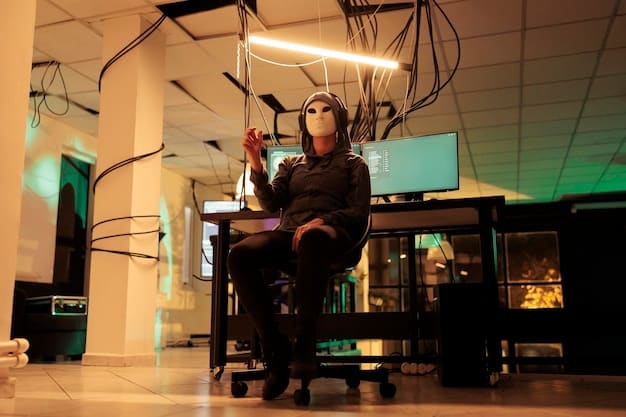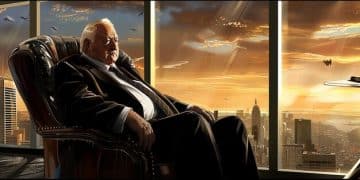Office Space: How a Flop Became a Cult Classic

Office Space, initially a box office disappointment, achieved cult classic status through word-of-mouth, home video, and relatable themes of corporate frustration, influencing pop culture and solidifying its place in film history.
What do you get when you mix corporate satire, mundane cubicle life, and a healthy dose of rebellion? You get Office Space, a film that resonated with disgruntled workers everywhere, transforming from a box office flop into a beloved cult classic.
The Initial Flop: Why Office Space Didn’t Click
Office Space, released in 1999, didn’t exactly set the box office on fire. In fact, it was considered a flop. But why didn’t it immediately resonate with audiences?
Several factors contributed to its initial underwhelming performance. Let’s delve into the reasons behind the slow start for what would become a massive cult favorite.
Release Timing and Marketing
The movie was released during a crowded period for films, facing stiff competition from other comedies and blockbusters. Plus, the marketing campaign didn’t quite capture the essence of the film’s humor.
Subtle Satire
Unlike broad, slapstick comedies, Office Space relied on subtle satire and observational humor, which took time for audiences to appreciate. Sometimes the best jokes are the ones you need to live to truly get.
- Limited Initial Buzz: The lack of a strong initial marketing push led to low awareness among potential viewers.
- Word-of-Mouth Delay: It took time for positive word-of-mouth to spread, hindering early ticket sales.
- Misunderstood Genre: The film’s blend of comedy and social commentary wasn’t easily categorized, confusing some viewers.
Despite the initial setbacks, something special was brewing beneath the surface. The movie’s core themes had the potential to resonate with a generation.

The Rise of a Cult Classic: How Office Space Found Its Audience
So, how did a movie that initially bombed at the box office become a cult classic? The answer lies in its relatability and the power of the home video market.
As more people discovered Office Space on DVD and through word-of-mouth, its reputation began to grow exponentially.
DVD and Home Video
The DVD release allowed audiences to discover and share the film at their own pace. This format facilitated repeat viewings and deeper appreciation of the humor.
Relatability of Themes
The film’s themes of workplace frustration, corporate absurdity, and the desire for freedom resonated with a wide audience, particularly those in white-collar jobs.
- DVD Boom: The rise of DVD players created a new avenue for films to find an audience after their theatrical run.
- Viral Sharing: Fans eagerly shared the movie with friends, leading to organic growth in popularity.
- Workplace Culture: The film tapped into universal feelings of dissatisfaction with corporate culture and the daily grind.
With each DVD shared and every office worker relating to Peter Gibbons’ plight, Office Space slowly but surely clawed its way into popular culture, readying itself for immortality.
The Relatable Characters: Peter Gibbons and the Gang
One of the key reasons for Office Space’s enduring appeal is its cast of relatable characters. Each member of the ensemble embodies a particular aspect of office life.
From the disenchanted Peter Gibbons to the quirky Milton Waddams, the characters mirror the personalities and frustrations found in many workplaces.
Peter Gibbons
Peter’s journey from apathetic employee to someone who questions the system is something many viewers can identify with.
Milton Waddams
Milton’s quiet resentment and eventual act of rebellion make him a sympathetic figure, despite his oddities.
- Relatable Archetypes: The characters represent common workplace stereotypes, making them instantly recognizable.
- Audience Empathy: Viewers empathize with the characters’ struggles and frustrations, forging a strong connection.
- Character Development: The characters’ arcs, particularly Peter’s, offer a sense of hope and possibility.
Through each character, writer and director Mike Judge gave the audience a piece of themselves and their coworkers, whether they realized it or not. The everyday lives that he captured would turn out timeless.
Mike Judge’s Vision: Capturing Corporate Absurdity
The genius behind Office Space lies in Mike Judge’s ability to capture the absurdity of corporate life with sharp wit and keen observation.
Judge’s unique comedic vision shines through in every scene, creating a film that is both hilarious and thought-provoking.
Satirical Genius
Judge’s background in animation and his understanding of social dynamics allowed him to create a movie that is both funny and insightful.
Attention to Detail
The film’s authenticity stems from Judge’s meticulous attention to detail, from the drab office décor to the mundane conversations.
- Personal Experience: Judge drew from his own experiences working in an office environment, lending authenticity to the film.
- Social Commentary: The movie offers a critique of corporate culture and the dehumanizing effects of modern workplaces.
- Unique Humor: Judge’s distinct comedic style, characterized by subtle satire and relatable scenarios, sets the film apart.
By blending personal experience with sharp social commentary, Judge crafted a timeless piece of cinema that continues to resonate with audiences on both sides of the cubicle.

Impact on Pop Culture: Quotes and References
Office Space has had a significant impact on pop culture, spawning countless quotes, memes, and references that continue to circulate today.
From “PC Load Letter” to “Sounds like somebody’s got a case of the Mondays,” the film’s memorable lines have become ingrained in the collective consciousness.
Memorable Quotes
The movie is packed with quotable lines that perfectly capture the frustrations and absurdities of office life.
Cultural References
Office Space has been referenced in numerous TV shows, movies, and other media, further solidifying its place in pop culture.
- Meme Culture: The film’s memorable scenes and quotes have been widely used in internet memes, keeping the film relevant.
- Workplace Lingo: Phrases from the movie have entered common workplace lingo, reflecting the film’s influence on everyday communication.
- Parodies and Homages: Many TV shows and movies have parodied or paid homage to Office Space, demonstrating its lasting cultural impact.
This constant recirculation keeps the film fresh in the mind of countless workers, new and old, and only fortifies the movie’s role as a touchstone of corporate satire.
Lasting Legacy: Why Office Space Still Resonates Today
Even decades after its release, Office Space continues to resonate with audiences. The film’s themes of workplace disillusionment and the search for meaning remain as relevant as ever.
In a world where many people spend a significant portion of their lives in office environments, the movie’s message of rebellion and authenticity still strikes a chord.
Timeless Themes
The film’s exploration of universal human desires, such as freedom, autonomy, and fulfillment, ensures its lasting appeal.
Enduring Humor
Office Space’s wit remains sharp and relatable, providing a source of laughter for each new generation of office workers.
- Generational Connection: The film’s themes resonate with both older and younger generations of workers, bridging the gap between different age groups.
- Critique of Modern Work: The movie offers a sharp critique of modern work culture, prompting viewers to question their own relationship with their jobs.
- Sense of Hope: Despite its satirical tone, the film offers a sense of hope and possibility, encouraging viewers to pursue their own passions.
In conclusion, Office Space isn’t just a movie; it’s a cultural touchstone that continues to inspire and entertain audiences worldwide. Its enduring relevance speaks to the universal desire for meaning and autonomy in our increasingly corporate world.
| Key Point | Brief Description |
|---|---|
| 🎬 Initial Flop | The film didn’t perform well at the box office upon its initial release. |
| 🔥 Cult Status | Gained significant popularity over time through DVD sales and word-of-mouth. |
| 🏢 Relatable Themes | Addresses corporate dissatisfaction and the desire for workplace freedom. |
| 🤣 Lasting Humor | Continues to be funny and relevant, appealing to new generations of viewers. |
FAQ
▼
The film faced stiff competition upon release and had a marketing campaign that didn’t quite capture its essence. Its subtle satire also took time to resonate with audiences.
▼
The film’s popularity rose significantly through DVD sales and positive word-of-mouth. People connected with its relatable themes of workplace frustration.
▼
Popular quotes include “PC Load Letter” and “Sounds like somebody’s got a case of the Mondays,” which have become ingrained in pop culture.
▼
The film’s characters embody common workplace archetypes, and its themes of corporate absurdity and the desire for freedom resonate widely with workers.
▼
The film’s critique of modern work culture and its exploration of universal human desires, like autonomy and fulfillment, keep it relevant for each new generation.
Conclusion
Office Space’s journey from box office disappointment to cult classic is a testament to the film’s unique appeal and enduring relevance. Its relatable characters, sharp satire, and timeless themes continue to resonate with audiences, solidifying its place as a beloved and influential piece of cinematic history.





